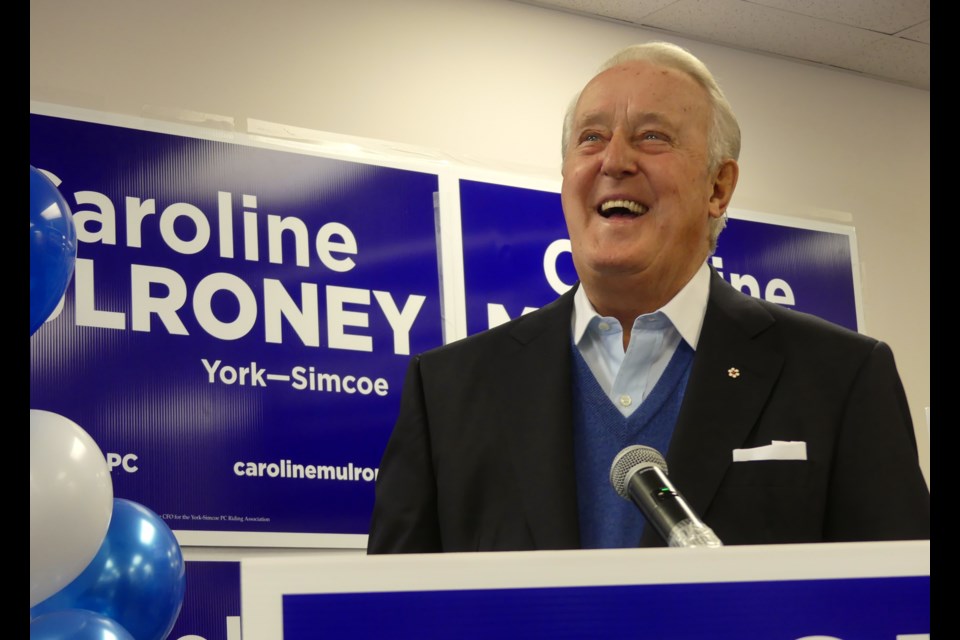The following guest column was written by long-time Simcoe North MP Doug Lewis, of Orillia, who served under Prime Minister Brian Mulroney and served in his Cabinet for several years. He and his wife will be attending the state funeral in Montreal later this month.
Since I knew and worked closely with the late Prime Minister Brian Mulroney, I thought it was important to describe how I will remember him.
Brian Mulroney came from humble beginnings and is reported to be the first Prime Minister from the working class. His father was an electrician in Baie Comeau, Quebec, a city of 21,000, on the north shore of the St. Lawrence River. His parents sent him to St. Francis Xavier University in Nova Scotia. He later went to Laval University and became a lawyer.
As a lifelong Progressive Conservative he contested the leadership of the party in 1976, losing to Joe Clark, and winning in 1983. In the election of 1984 he won the largest majority in Canadian history.
Free trade was his first major challenge. He rejected the concept until he read the MacDonald Commission report which recommended free trade. He changed his mind and the 1988 election was fought on the issue of free trade. He won that election with a reduced, but substantial, majority.
He then turned his attention to Canada's finances. The federal sales tax was broken and ineffective. The Goods and Services Tax was designed to return Canada to fiscal responsibility. No tax is popular and the GST helped to reduce his popularity with Canadians.
He didn't feel that government should be in business and privatized Petro Canada, Canadian National Railways and Air Canada.
In order to get Quebec to sign on to the Canada Act and the Constitution he devised the Meech Lake agreement and the Charlottetown Accord. Both consumed time and energy and both failed, thus reducing his popularity even further. But he tried.
On the international front, he fought South Africa's discriminatory apartheid policy at the Commonwealth much to Margaret Thatcher's annoyance. He worked for the reduction of acid rain from the United States.
His family was a major focus for him. Mila and the children were always top of mind. They raised four successful children.
The Progressive Conservative caucus was an extension of his family and got special and personal attention. As a result, he commanded absolute loyalty. At the same time, political opponents were not totally forgotten. Opposition members would often comment to me as to how he had reached out to them in times of personal stress and tragedy. His antenna was always working.
Much of what he accomplished internationally was because he cultivated strong relationships with international leaders. Free trade and acid rain progress was because he related to American presidents on a personal basis.
He was human. He had his battles with alcoholism until he quit drinking for good. After he left politics he accepted a cash retainer from German arms dealer Karl Schreiber, which he put in a safety deposit box before doing any work. He acknowledged his relationship. I put that down to his “business smarts” being rusty.
My favourite memory of him was after the Free Trade election in the fall of 1988. We won the vote, but we had a procedural problem. The Free Trade negotiating agreement required that it be passed by the House of Commons and the Senate by Dec. 31, 1988. The election was held on Nov. 21 and elected members had to be certified and sitting in the House of Commons to pass the legislation.
My advisors and the Clerk of the House of Commons couldn't find a way to get it done in time.
I applied my experience in the House of Commons to the rules and I found a way to do it. My advisors and the Clerk agreed and we proceeded to get it passed on time.
On the evening of Dec. 14, 1988 I was sitting in the House of Commons making sure everything went properly when a Page brought me a note from Brian Mulroney thanking me for my role in “this historic event” along with a bottle of champagne.
In January of 1989 I was appointed Attorney General of Canada, Minister of Justice and Government House Leader. As a result, the riding of Simcoe North gained a profile which it never had before.
Canada has lost the physical presence of a giant and gained the legacy of a true leader.
